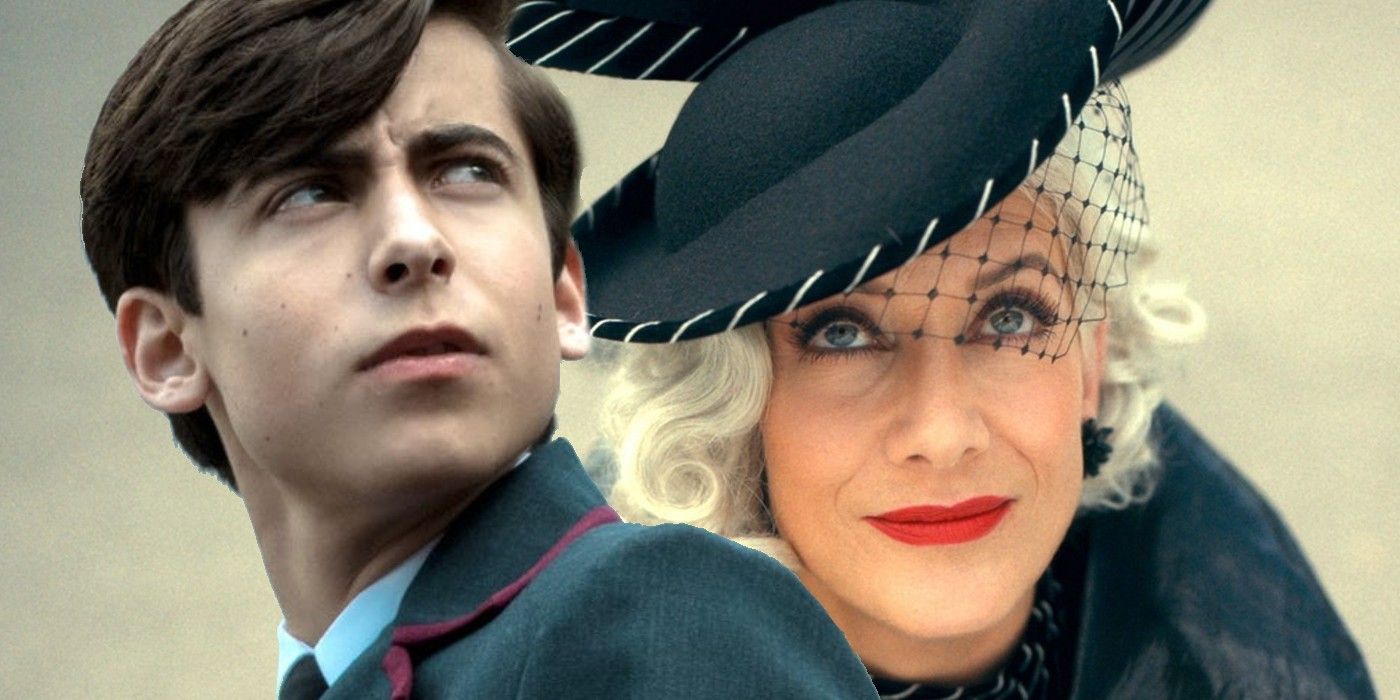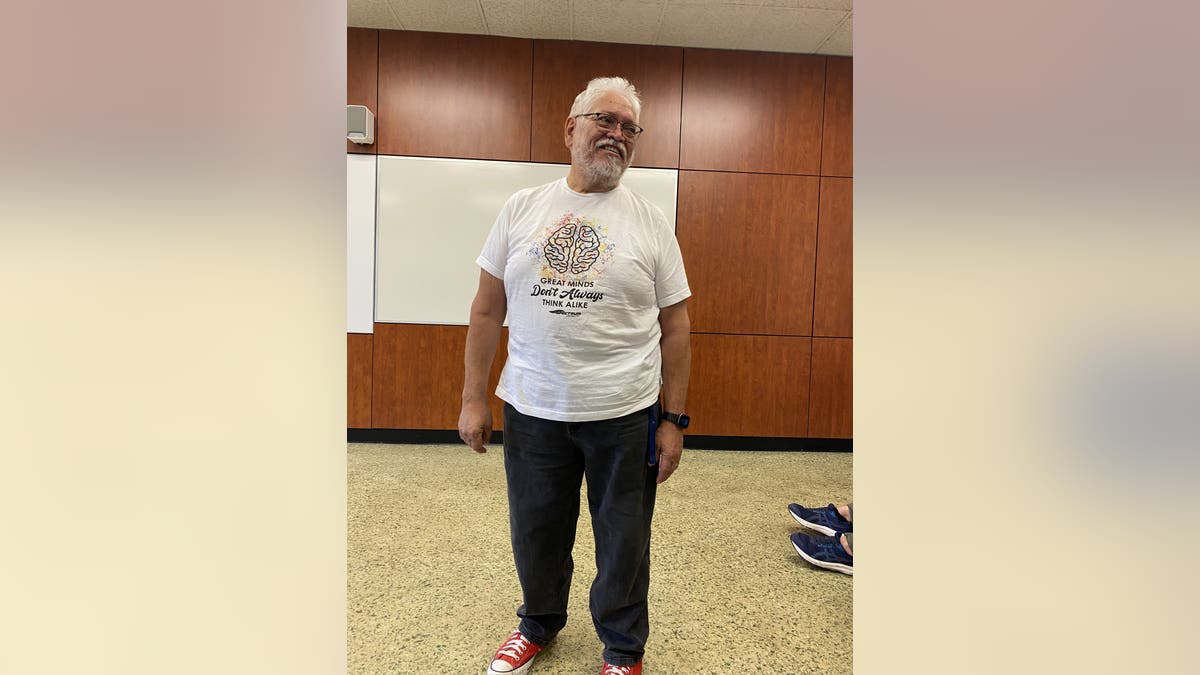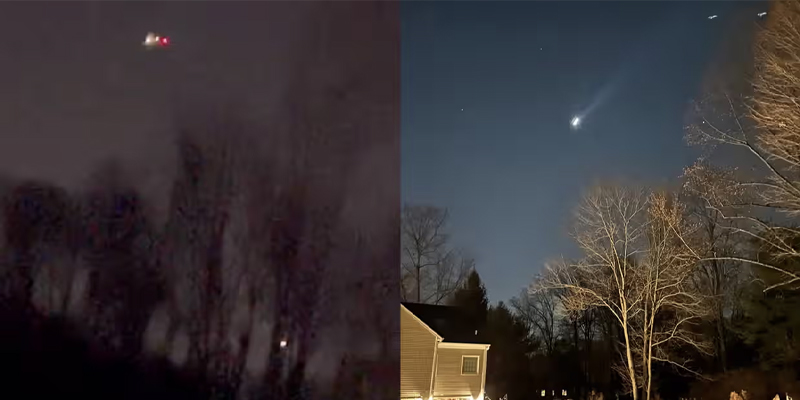Figuring out how time travel works in The Umbrella Academy isn’t entirely straightforward. Landing on Netflix back in 2019, The Umbrella Academy season 1 was a major hit, with fans and critics praising Steve Blackman’s live-action adaptation of the comic books by My Chemical Romance’s Gerard Way. The story focuses on the six-and-a-ghost Hargreeves siblings – a group of children who were miraculously conceived, born simultaneously, and gifted with unique superpowers before being adopted by the mysterious Reginald Hargreeves and whipped into a crime-fighting force. One of these vigilantes, the boy genius known only as Number Five, possesses the ability to move through time and space.
Time travel played a small but vital role in The Umbrella Academy season 1. While the Academy were still young, Five made an ill-advised jump forward in time, landing in a post-apocalyptic future. After decades spent living alone, romancing mannequins and working as an assassin, Five managed to find a way back to his family, arriving in 2019 mere days before the apocalypse was supposed to happen. Five and his siblings desperately try to avert the future before realizing one of their own was the cause, with Vanya destroying the moon after rediscovering her latent powers. In a last ditch effort to save the world, Five grabbed his siblings and made a hopeful leap through time before The Umbrella Academy season 2.
Naturally, the second run of Hargreeves adventures delved deeper down the rabbit hole of time travel. The siblings landed in the 1960s and realize the apocalypse has followed them, giving the gang two world-ending cataclysms to stop before somehow finding a way back home to 2019. Every time travel story sets its own parameters and rules, and with The Umbrella Academy season 2 expanding on the timeline tomfoolery of season 1, its own rule book becomes clearer… and simultaneously much more complex. Here is The Umbrella Academy‘s time travel explained ahead of season 3.
How To Time Travel In The Umbrella Academy
There are essentially two ways to cheat the timeline in The Umbrella Academy‘s universe. Number Five’s inherent ability allows him to jump through time in either direction. Alas, time travel isn’t easy to control. When Five makes his first jump as a teenager, he lands roughly a decade into the future, but is unable to get back to his own timeline. Five finally makes the return trip using an elaborate series of equations written during his many years away, but even then he makes a mathematical error that dumps him back home as a child instead of the gray-haired man he had grown into. For Five, time travel isn’t as simple as the movies make it look, but by The Umbrella Academy season 2 ending, the pint-sized hit-man starts to make small leaps successfully, undoing the moment The Handler kills his entire family in the season finale.
The other way to traverse through time in The Umbrella Academy is via one of The Commission’s briefcases. A mysterious time-travelling organization of unknown origin, The Commission are responsible for maintaining the natural order of history (or at least the order they deem natural). The Commission sends agents to various points in time, ensuring key events such as the Kennedy assassination, the apocalypse and the Hindenburg disaster happen as intended. Instead of one of the stereotypical science-fiction MacGuffins, The Commission use mechanical briefcases that create a field around the user(s) and take them precisely to their intended destination. Travelers might feel side effects of nausea and slight disorientation, but this method of time travel is far more accurate and reliable than Five’s superpower, although the briefcases do seem surprisingly easy to destroy. This means that The Umbrella Academy‘s time travel rules, while admittedly complex, do follow a cohesive logic throughout.
The Umbrella Academy’s Time Travel Rules Explained
Like most time travel stories, The Umbrella Academy seemingly subscribes to the idea that only one timeline exists, and said timeline can be changed via the Butterfly Effect – a phenomenon where a person goes back in time, changes something, and inadvertently causes their present-day to look very different upon returning. It’s clear that this is the model The Umbrella Academy uses because of Five’s apocalyptic foresight. Five travels to two different apocalyptic futures, and both times the Hargreeves’ siblings manage to alter the future he saw, arriving back in 2019 at the end of season 2 and finding out Vanya’s moon destruction had been erased. It’s also worth noting that when Five was living alone in the apocalypse, the moon was still intact, proving his intervention even changed how the world would end. Likewise, Ben’s sacrifice stops the nuclear war, while Five and Hazel are reunited at the beginning of The Umbrella Academy‘s second season. As far as The Umbrella Academy is concerned, nothing in history is set in stone, which perhaps explains the need for a Commission in the first place.
Broadly speaking, any fictional story that broaches the troublesome topic of time travel can take one of two other routes – besides utilizing the Butterfly Effect approach. The first is the multiverse theory – the idea that going back in time and changing history doesn’t alter the original timeline but creates an entirely separate one. Examples of this can be seen in Avengers: Endgame and Dragon Ball Z, where characters meddle in the past and change key events, but their own timeline remains unchanged. This is not the case in each season of The Umbrella Academy.
The second theory is the so-called “whatever happened, happened” idea, which posits that changing history is effectively impossible because any changes made via time travel have already been applied. Examples of this can be seen in Lost and Doctor Who. For instance, if the Tenth Doctor lands in 16th century England and marries the Queen, he doesn’t alter history, he becomes it, because that marriage always happened. This philosophy suggests that however much a time traveler tries to break the timeline, they only end up adhering to a path that was already set out by the cosmos, meaning history cannot ever be altered. The Umbrella Academy doesn’t take this route either.
The Sparrow Academy twist at the end of The Umbrella Academy season 2 is further proof of the show’s Butterfly Effect. No one knows how it happened, but whatever the Hargreeves siblings did in the 1960s has made their present-day unrecognizable. In this way, the show actually adopts many of the tropes of the classic cautionary time travel tale – in that even the slightest alteration can have huge consequences. While this solidifies some theories around how The Umbrella Academy‘s time travel works, it also raises several questions for season 3.
Umbrella Academy’s Time Travel Can Cause Paradox Psychosis
Another key impact of The Umbrella Academy‘s time travel rules is the potential for paradox psychosis. Most notably demonstrated by Five, this phenomenon occurs when a character interacts with an alternate version of themself. Clearly, humans crossing paths with themselves as a result of time travel is enough to confuse even the most stable mind and the consequences of this are on full display in Netflix’s The Umbrella Academy.
The show explains the impact of paradox psychosis in graphic detail. The condition has seven identifiable stages: denial, itching, extreme thirst and urination, excessive gas, acute paranoia, uncontrollable sweating and homicidal rage. These effects are aptly demonstrated when Five chooses to interact with Five in a desperate attempt to save humanity – proving that even with powers as potentially significant as time travel, the impacts of a false step can be devastating for the person involved, as well as the wider world.
The Future Of Time Travel In The Umbrella Academy Season 3
The Sparrow Academy potentially sets up even more time travel antics ahead of The Umbrella Academy season 3, but the key issue will be how the show handles paradoxes. When the Hargreeves family were trying to stop the apocalypse (both of them), they were altering events that, from their perspective at least, hadn’t happened yet. This meant they didn’t have to worry about paradoxes. Somewhere along the line, the Academy’s actions changed the course of history from 1963 to 2019, with Sir Reginald creating the Sparrow Academy from an entirely different roster of children. Unlike before, this directly affects each character’s past. For example, Diego is a skilled combatant because he was trained by Reginald at the Umbrella Academy, but if the timeline changed so that Reginald never adopted Diego, would he lose those skills?
Perhaps the most famous example of the time travel paradox is Back to the Future, where Marty McFly accidentally prevents his parents falling in love while time-traveling in the past, and subsequently starts disappearing from a photograph taken in the present. In the reworked 2019, The Umbrella Academy all experienced completely different lives, so following Marty’s lead, will they begin forgetting each other and Sir Reginald’s training, since this technically never happened? Not all time travel stories take this route; some authors see a time traveler’s personal timeline as fixed, so knowledge and memories from before history was changed remain intact. Either way, establishing exactly how does time travel work in The Umbrella Academy is potentially more complex and important than ever.
The other major point to address in season 3 is how the Hargreeves siblings will react to Reginald’s “Sparrow Academy.” Working with the “single timeline” theory, Five has two choices – either go back again, identify what went wrong and put it right, or simply accept things as they are, and of those two options, the latter seems far more likely. The Umbrella Academy season 3 taking place in the altered Sparrow timeline would allow Reginald to play a bigger part (by virtue of still being alive) and give the Umbrella kids the same “fish out of water” feel that worked so well in season 2. As long as there aren’t any disappearing photographs to worry about, none of the main 6 characters are likely to be upset that their horrible adoptive father no longer recognizes them as his own. A temptation to fix things might arise when other unforeseen timeline changes begin to emerge. For instance, if Allison wasn’t a member of the Umbrella Academy and a famous celebrity, she might’ve never met her ex-husband, and therefore her daughter would no longer exist. If that were the case, The Umbrella Academy season 3 could see Team Umbrella trying to fix the timeline and Team Sparrow trying to stop them.
Is Elliott Page Playing Vanya In The Umbrella Academy Season 3?
Want more Umbrella Academy Articles? Check out our essential reading below…
About The Author


























































